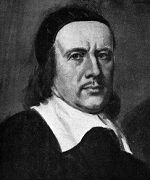Readings:
Ecclesiastes 3:1-15
Psalm 114
Romans 14:7-12
Mark 13:32-37Preface of a Saint (1)
[Common of a Theologian and Teacher]
[Common of a Pastor]
[For the Ministry II]
PRAYER (traditional language)
O God, whose days are without end, and whose mercies cannot be numbered: Make us, we beseech thee, like thy servant Jeremy Taylor, deeply sensible of the shortness and uncertainty of human life; and let thy Holy Ghost lead us in holiness and righteousness all our days, through Jesus Christ our Lord, who liveth and reigneth with thee and the Holy Ghost, one God, now and for ever. Amen.
PRAYER (contemporary language)
O God, whose days are without end, and whose mercies cannot be numbered: Make us, like your servant Jeremy Taylor, deeply aware of the shortness and uncertainty of human life; and let your Holy Spirit lead us in holiness and righteousness all our days, through Jesus Christ our Lord, who lives and reigns with you and the Holy Spirit, one God, now and for ever. Amen.
Lessons revised at General Convention 2024
Return to Lectionary Home Page
Webmaster: Charles Wohlers
Last updated: 10 July 2024
JEREMY TAYLOR
BISHOP AND THEOLOGIAN (13 AUGUST 1667)
 Jeremy
Taylor was born at Cambridge in 1613 and ordained in 1633. In the years
between 1633 and the ascendency of the Puritans in 1645, he was a Fellow
of two Cambridge colleges, and chaplain to Archbishop Laud and to King Charles.
Under Puritan rule, he was imprisoned three times, and forced into retirement
as a family chaplain in Wales. After the Restoration, in 1661, he became
Bishop of Down and Connor in Ireland. Among his many books on theological,
moral, and devotional subjects, the best known are The Rule and Exercises
of Holy Living (1650) and The Rule and Exercises of Holy Dying (1651),
usually cited simply as Holy
Living
and Holy Dying.
Jeremy
Taylor was born at Cambridge in 1613 and ordained in 1633. In the years
between 1633 and the ascendency of the Puritans in 1645, he was a Fellow
of two Cambridge colleges, and chaplain to Archbishop Laud and to King Charles.
Under Puritan rule, he was imprisoned three times, and forced into retirement
as a family chaplain in Wales. After the Restoration, in 1661, he became
Bishop of Down and Connor in Ireland. Among his many books on theological,
moral, and devotional subjects, the best known are The Rule and Exercises
of Holy Living (1650) and The Rule and Exercises of Holy Dying (1651),
usually cited simply as Holy
Living
and Holy Dying. Many readers, including Charles Wesley a century later, have reported finding these books of great spiritual benefit. Another work of his, Liberty of Prophesying, argues for freedom of conscience and freedom of speech in a religious context. Being stationed in an area that was largely Roman Catholic, he was, perhaps inevitably, drawn into controversy, and he wrote a book called Dissuasion (or Dissuasive) against Popery.
One of the prayers for the Visitation of the Sick as found in the Book of Common Prayer (p 316 in the 1928 American edition) was written by Taylor. It reads as follows:
O God, whose days are without end, and whose mercies cannot be numbered;
Make us, we beseech thee, deeply sensible of the shortness and uncertainty
of human life; and let thy Holy Spirit lead us in holiness and righteousness
all our days: that, when we shall have served thee in our generation, we
may be gathered unto our fathers, having the testimony of a good conscience;
in the communion of the Catholic Church; in the confidence of a certain
faith; in the comfort of a reasonable, religious, and holy hope; in favour
with thee our God, and in perfect charity with the world. All which we
ask through Jesus Christ our Lord.
by James Kiefer